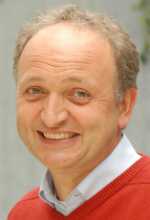The National Ground Water Association (NGWA) and the Research Educational Foundation will feature Dr. Rainer H. Helmig in the 2015 Henry Darcy Distinguished Lecture Series in Groundwater Science.

|
| Helmig |
Helmig, the head of the Department of Hydromechanics and Modelling of Hydrosystems at the Institute for Modelling Hydraulic and Environmental Systems, University of Stuttgart, Germany, will deliver two lectures.
His first lecture, "Evaluating the Competitive Use of the Subsurface: The Influence of Energy Storage and Production in Groundwater," will discuss the expanding need for advanced numerical models that can be used to analyze and predict the mutual influence of subsurface projects and their impact on groundwater reservoirs.
The lecture will explain the increasing number and complexity of resource conflicts as the subsurface is being used as both a resource and as an energy and waste repository. One example of these conflicts is thermal energy storage and the effects surrounding hydraulic fracturing in both geothermal and shale gas production.
Helmig plans to focus on some of the following areas:
- Possible utilization conflicts in subsurface systems and how groundwater is affected.
- Fundamental properties and functions of a compositional multiphase system in a porous medium; the lecture will introduce basic multiscale and multiphysics concepts and will formulate conservation laws.
- The general applicability of the modeling concepts shown through large-scale simulation. He will particularly emphasize the impact that simultaneously using geothermal energy and storing chemical and thermal energy has on groundwater. He will explain how large-scale systems provide a good environment for finding a balance between the efficiency potential and the possible weaknesses of the various approaches.
Helmig’s second lecture will be entitled, “Modeling and Analysis of Soil-Moisture Processes in the Subsurface: The Influence of Evaporation and Salt Precipitation in Groundwater.” This lecture will discuss the crucial role that soil-moisture processes in the subsurface play in in the hydrological cycle and the groundwater budget.
The lecture is intended to afford a clearer understanding of soil-moisture conditions to those in land-atmospheric interaction, soil evaporation and evapotranspiration, and climate modeling.
The lecture will also explore emerging problems in assessing risks that affects groundwater quality and vegetation — like the leakage of carbon dioxide or methane from deep geological formations to the shallow subsurface.
In his second lecture, Helmig plans to focus on some of the following areas:
- Relevant processes of mass, momentum and energy transfer at the interface between a free-flow and a porous-media system.
- Conceptual modeling for coupled single-phase free flow and two-phase porous-medium flow with a detailed description of the models in the free flow and in the porous medium.
- A new coupling concept for modeling coupled porous-medium and free flow with application to evaporation and salt-precipitation processes; a comparison study will show the advantages and disadvantages in comparison with classical approaches.
- Three model combinations for evaporation processes and how to use them to study the effects of various quantities and processes: 1.) a porous-medium model coupled with a laminar free-flow model, 2.) a simple boundary-layer model, and 3.) a Reynolds-averaged turbulence model that uses algebraic expressions to account for the turbulent flow behavior.
NGWA is a nonprofit that supports responsible development, management and use of water resources. It’s comprised of groundwater professionals ranging from contractors to equipment manufacturers to scientists and engineers. For more information, visit www.ngwa.org.





Report Abusive Comment